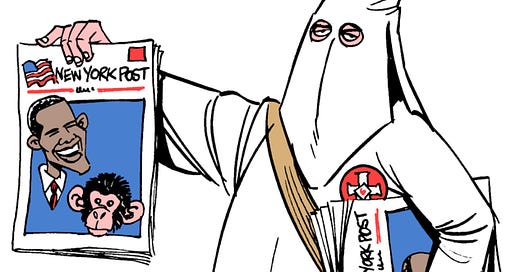May 8, 2009: Cross Burnings in 21st-Century America
America's Conservatism Inc. must reckon with how their ideological hubris reinvigorated racist structures utilized to humiliate labor advocates and confuse economic reforms.

Today in 2009, not 1929, a former “exalted cyclops” of the International Keystone Knights of the Ku Klux Klan traveled to an African American neighborhood in Ozark, Alabama, and burned a cross to signal racial hate and systemic racial oppression. The perpetrator, Steven Joshua Dinkle, was arrested in 2013 and pleaded guilty in 2014 before serving in prison for over a year.
He said he “burned the cross because of the victims’ race and color and because they were occupying homes.”
Dinkle has been in and out of the justice system after being released for the cross burning in 2015. He was sentenced for illegal firearms possession in 2016 and convicted of sexual assault of a medicated woman in 2017.
It stunning that an event like this could happen in 21st-century America, however, it is not shocking.
The stunning side of it comes from a realization of how potent American racism is in the wake of electing the first Black president. American style racism is a revanchist and antimodern essence that can have so much influence and proliferation on a modern, restless international giant. The election of Donald J. Trump to the highest office (after he ran an overtly white grievance-based campaign) is also a signal of rapid, revanchist American decline. It’s really a testament to the destabilizing power of race.
Though, that destabilization is also perpetuated by the way credible thinkers on the American right deny its torrid connection to debilitating a hypermodern nation on the cusp of futuristic achievements and reveling in nuclear dominance.
A lot of well-meaning White Americans are blind to the realities of American racism.
It’s hard to fully understand the discomforts of being a token in a boardroom, classroom, or at an exclusive club if you’ve never been in that situation. Many do not see the culminating inequalities for people of color facing advancement bottlenecks because of the perceptions hoisted upon them by their leadership and their coworkers of another ethnicity. Often punditized is how members of the “White working class” are barely able to keep up with civic developments in a gig economy that is constantly demanding energy be used for holding multiple, low paying jobs. So, one can imagine how this same issue impacts working people of color who also deal with the systemic bigotry as a compounding obstacle.
America’s soul was forged in the fires of a Civil War, which was about the economic, social, and civic fate of free Black Americans - a group of people tied to this land through blood as the dominant population and leadership scorned them as origin-free, feeble, underdeveloped, and subhuman.
As we are reminded of what this “exalted cyclops” of the Ozark chapter of the Ku Klux Klan did in a Black neighborhood in the modern year of 2009, we are also faced with dark truths about American democracy and about modern conservatism as a philosophical launder for bigotry and elitism. The cultural pressures that make assimilation a fundamentally anti-Black enterprise still exist in 21st century America.
The original sin of modern American conservatism is thought leaders and architects refusing to admit that they were revitalizing anti-Black, and broadly anti-marginalized peoples, structures through an esoteric and selfish interpretation of modern bureaucracies. For all of its bloat and red tape, the expansion of the federal government (and the ensuing democratization) was necessary in a new nation with little labor protections and that was incentivized to carelessly move forward, even on top of the blood and bones of marginalized groups who are forgotten in the fast-paced push for progress and renewal. Too many conservatives want to overlook this aspect of why the government expanded in the interest of labor and how its lessening role in a nation scarred by anti-Black (and thus anti-labor) systems has perpetuated an American underclass that can be overlooked through a religion of privatization and a mythology around personal responsibility and personal fortunes.
This blindspot, in my opinion, is the intellectual weakness for American conservatives.
In order to bring back common-sense political thought, good faith conservatives must reckon with their social and economic blindspots. They will need to see how their insistence on demonizing government and trusting the markets over people (some of whom may not have grown up in the de facto segregated neighborhood) perpetuates income inequality and health disparities that keep Black Americans living in a structural nightmare.
However, conservatives have to want this intellectual and personal reckoning for a healthier society, but it will inevitably alter their own pollyannish view of America.
Some are willing to do this, but many aren’t.
Without that intellectual reckoning, vicious cycles (that have much to do with race) are perpetuated by the condescension and hubris of arrogant elitists and some of the, but far from all, members of America’s dominant ethnic group.
We will continue to have offshoots of the Klan (and the actual one) miring American progress.
We will continue to be a developed nation without healthcare.
We will continue to have a growing educational deficit due to an inability to come to federal conclusions and standards (a legacy of the Jim Crow south).
We will continue to have kids and citizens shot by semi-automatic weapons as a political party relies on votes by perpetuating a multitude of fears, some of which have to do with demographic changes in America.
But for American descendants of slavery (ADOS) this is not new. Life in this country continues to be a searing cascade of contradictions and microaggressions for the ADOS community.






Everything I thought had been settled 50 years ago - it turns out I was wrong. Every. Damn. Thing.